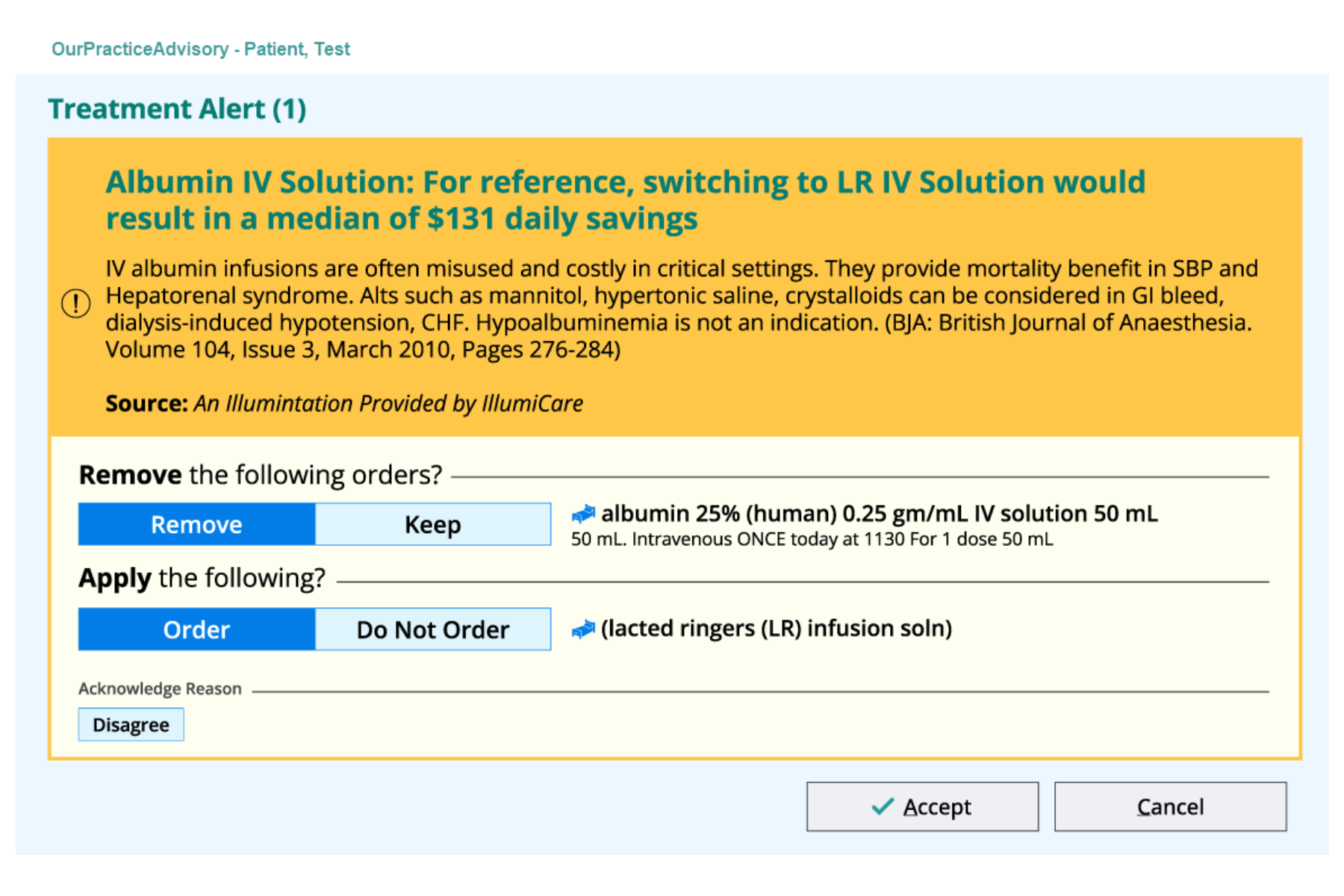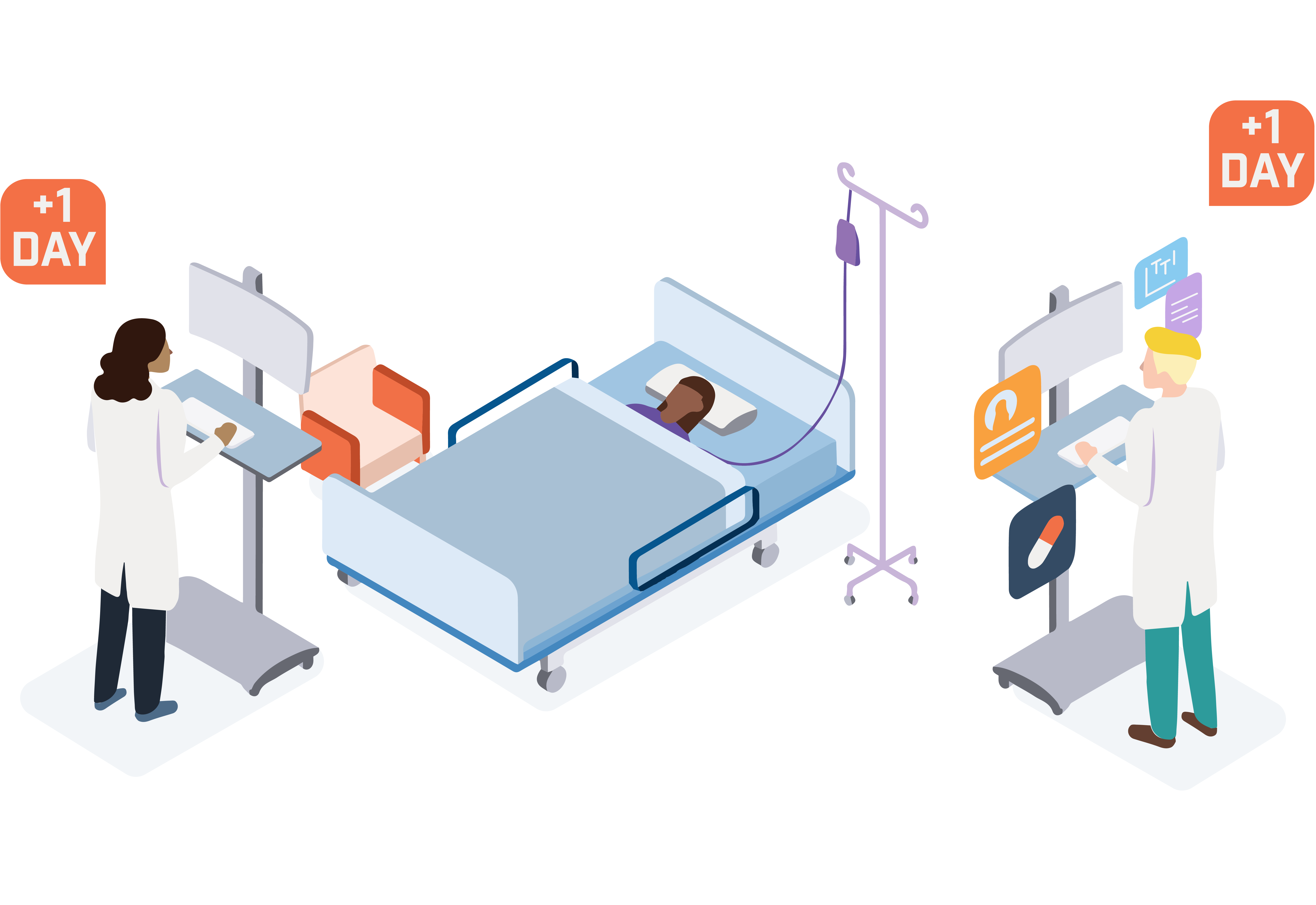Providers Positively influenced by clinical / financial decision support in order workflow
- posted January 2025
At MultiCare Health System, providers are responding to clinical financial decision support nudges that appear in their ordering workflow, saving ~$179 per accepted recommendation.
What is Clinical / Financial Decision Support?
"The use of intravenous sodium bicarbonate to treat acidemia is of limited clinical benefit, except in patients with renal insufficiency.” This is one of over 1,000 clinical financial decision support rules IllumiCare has built over the last nine years. The reason why we chose sodium bicarbonate as one target is that our real-time data from client health systems shows:
- 82% of the time it is used inappropriately;
- Wholesale acquisition cost to the hospital for the typical dose is $153 per day;
- In one sample client, inappropriate use of just sodium bicarb added up to nearly $1 million per year;
- 16% of providers account for 80% of the inappropriate use; and
- Most of the inpatient costs are not directly reimbursed (e.g., DRG payment).
Traditional CDS is focused on harm avoidance and diagnostic / therapeutic pathway adherence. There is no consideration of the actual costs when multiple diagnostic and therapeutic options exist. IllumiCare considers the unnecessary use of the more expensive option as “clinical waste” and nudges providers (with cost as a value component) when multiple options exist. This is true “clinical / financial decision support.” While the more expensive option may not physically harm the patient, it adds little benefit and only drives up costs.
Research Highlights
- Dataset included 100,000 clinical users and real-time analysis of over 5 million hospital admissions
- In one sample client, inappropriate use of just sodium bicarb added up to nearly $1 million per year
- 16% of providers account for 80% of the inappropriate use for one target medication
- The “5 rights” of clinical decision support (CDS) are: the right information, to the right person, in the right format, through the right channel, at the right time in the workflow
- 26% of the time, providers accepted the IllumiCare suggestion (23% for medications and 36% for lab orders)
- MultiCare is saving approximately $81 per discharge
These increased costs are a detriment to hospital margins and drive up patient bills, which is a problem when 530,000 families turn to bankruptcy each year because of medical issues and bills. 30% of medical debt is due to the costs of a recent inpatient stay. Also, a previous eReport found that these specific wasteful behaviors predict 47% of provider spending variation. Clinicians now must care for their patients clinically and attend to the financial consequences, a new modern day iatrogenic sequela of clinical decision making.
Avoiding Alert Fatigue
Founded by numerous physicians and healthcare leaders, IllumiCare is grounded with great empathy for provider cognitive load, bandwidth and autonomy. While we have valuable proprietary content, much of our technical work has gone into what not to say and when not to say it. With about 100,000 clinical users and having real-time analysis of over 5 million hospital admissions, we have tracked user responses when we “nudge” in their workflow with our content. This dataset has allowed us to build models to predict the context of patient attributes, provider attributes and other circumstances when it is most impactful to present our content to a user (and also to avoid the interruption if less likely to spark a behavior change).
Clinical Specificity
Clinicians respond to our guidance because IllumiCare monitors many real-time clinical indicators for appropriateness. Consider the sodium bicarb example above, where we filter on the latest pH value (<7.2), creatinine (>1.5) and/or a diagnosis of acute kidney injury. There are times when the use of expensive tests or medicines is clinically warranted. We emphasize when expensive options are used outside their clinical indication (which happens too frequently).
While hospitals have existing programs for pharmacy and lab review, it is very laborious for humans to review every order’s appropriateness. Instead, IllumiCare collaborates with key stakeholders so they can review and modify our rules and then allow our technology to intervene at the point of decision. Our data analytics (and peer comparison dataset) facilitate upstream changes (formulary, orderset, etc.), and our nudges drive downstream behavior change.
CDS Hooks as the Delivery Mechanism
The “5 rights” of clinical decision support (CDS) are: the right information, to the right person, in the right format, through the right channel, at the right time in the workflow. Over the past 18 months, we have developed and launched an optimal way to deliver our content - using a CDS Hook invoked OurPractice Advisory (OPA) when a user signs an order in Epic. The app is now available in Epic Connection Hub.
There is an Implementation Guide and Turbocharger to ease implementation. It uses a grouper (VCG) that establishes which medications or services initiate the external CDS web service call. IllumiCare has separate real-time data feeds and knows the diagnoses, lab results, imaging results, clinical notes, medications, indwelling devices, dietary status, etc. of every patient in the hospital. IllumiCare also knows every provider, their specialty, their historical utilization and spend on every medication and service (compared to peer benchmarks), their propensity to order send-out labs, advanced imaging on day of discharge, etc.
From this body of knowledge about the patient, the ordering provider and the circumstances, IllumiCare decides whether to present an OurPractice Advisory in the ordering process. If an alternative is presented, it uses a preference list (LPF) to populate the options. All of the content undergoes prior approval by the health system. A sample:

© 2024 Epic Systems Corporation
Provider Response Rate
MultiCare Health System (2,064 beds; Tacoma, WA) recently deployed the application. MultiCare has a CDS governance committee, which used IllumiCare analytics to target redundant or cost-inefficient medications and services.
We recognize physician autonomy and that every patient is unique. We don’t profess certainty in knowing what is best for a particular patient. As such, users may respond to an alert by either accepting IllumiCare’s recommendation or overriding the recommendation. After thousands of orders that triggered the CDS check with IllumiCare and the hundreds of times we chose to intervene, here are the results so far.
Twenty six percent (26%) of the time, providers accepted the IllumiCare suggestion. The response rate was 23% for medications and 36% for lab orders. Those numbers would be in the top quartile of response rates for an interruptive alert, when compared to native OPAs at similar health systems.
The initial launch of the CDS Hooks application was limited to twenty users and only four medications and three lab tests. Thus far, each time a user accepts IllumiCare’s recommendation it saves the hospital an average of $179.14. While only touching 20 of the 913 active IllumiCare users at MultiCare, just this element of the program is generating significant savings per month. When added to the other IllumiCare clinical / financial interventions, MultiCare is saving approximately $81 per discharge, benefiting both the health system and its patients. The CDS Hooks approach will now be expanded to additional users and orders (additional meds, labs, and then radiology), which will increase the savings over time.
About IllumiCare
Founded in 2014 in Birmingham, Ala. by a visionary physician and team of hospital IT experts, IllumiCare is dedicated to helping clinicians become better stewards of system and patient resources. Its Smart Ribbon® platform brings clinicians critical, patient-specific data in a focused view for expedited clinical decision making at the point of care, without disrupting clinical workflow.
To learn more, visit www.illumicare.com/ereports
Endnotes
Anesthesiology May 2021, Vol. 134, 774–783.
AJPH 109, 431-433, https://doi.org/10.2105/AJPH.2018.304901
Am Econ Rev. 2018 Feb; Economic Consequences of Hospital Admissions
https://www.illumicare.com/wp-content/uploads/2022/02/eReport5-wasteful-behaviors_V5.pdf
J Healthc Inf Manag 2009 Fall; 23(4): 38–45
Epic is a registered trademark of Epic Systems Corporation








